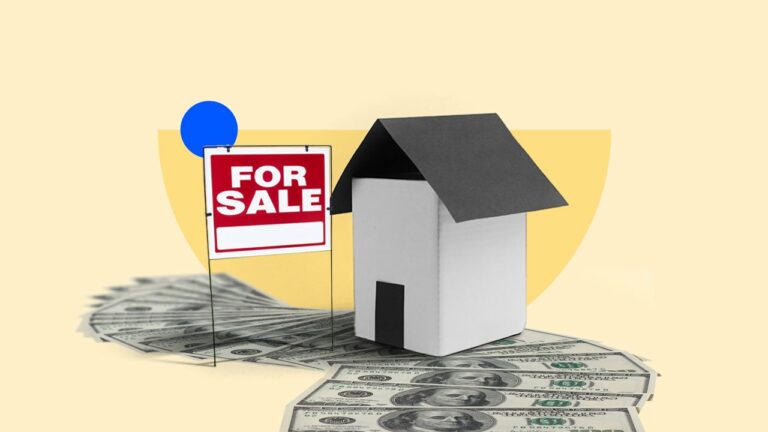FluxFactory/GettyImages; Illustration by Hunter Newton/Bankrate
Key takeaways
Deciding whether to sell your house or rent it out depends on personal circumstances, such as immediate cash needs and future housing plans.
Selling might be the better option if you need the proceeds to pay for your next home or stand to make a large profit.
Renting it out could be a good choice if you’re looking for additional income or if you’re moving temporarily and plan to come back.
There are many reasons why a homeowner might want to move. But whatever your reason, one question still applies: What should you do with your current home? Depending on your financial situation and your local housing market, you might consider renting it out rather than selling. If you’re caught in the sell versus rent debate, here are some factors to consider, including the costs.
Should I sell or rent my house?
A home is the biggest financial asset most people own, and deciding what to do with it shouldn’t be taken lightly. There are pros and cons to both options: For example, selling gets you a large windfall of cash all at once, while renting earns you smaller increments of steady monthly income from your tenants. If you have somewhere else to live and can afford to hang on to the house, renting it will also allow you to continue building equity as home values go up. Take a look at the following scenarios to determine which path is best for you.
When selling your home is a good choice
If you need the cash to pay for your next house
If your ability to buy a new home relies on accessing the money tied up in the current one, then selling is the best option. That way, you can take all your proceeds from the sale and put it toward your new down payment. Buying a new home while selling your current one can be a tricky balancing act, so be sure to work with an experienced real estate agent who can guide you through the process.
If you have no interest in being a landlord
Managing a rental property is time-consuming and often challenging. Are you handy and able to make some repairs yourself? If not, do you have a network of affordable contractors you can reach out to in a pinch? Consider whether you want to take on the added responsibility of being a landlord or paying for a third party to take care of things instead.
If you stand to make a significant profit
Property values have risen all over the country over the past few years, and home prices remain high. Depending on how long you’ve owned your home, how much you paid for it and how hot your local market is, selling could net you a significant windfall. Take a look at nearby real estate comps to see how much homes similar to yours have been selling for.
If you are eligible for capital gains tax exemptions
If you do sell your home for a profit, you may be able to exclude up to $250,000 of capital gains from the sale (or up to $500,000 for married couples filing jointly) from your taxes. For this to apply, the home must have been your primary residence for at least two out of the last five years, among other criteria.
When renting your home is a good choice
If your move is temporary
If your move is short-term and you plan on returning to your current city in the future, you may want to keep your home and rent it out in the meantime. Knowing there will be a place for you to live when you return provides peace of mind — and when you factor in closing costs, it may even cost less than selling and purchasing another home at a later date.
If you want the rental income
Extra income can be hard to turn down! But if you decide to rent your current home and want to buy another one with a mortgage, keep in mind that lenders will consider rental income when determining your financing. In some cases, a lender will only allow a portion of your rental income to be counted as an income source. In addition, you will be carrying two mortgages at once, so make sure this is something you are financially able to take on.
If rental demand in your area is high
Is your home in a hot neighborhood with lots of buzz? Is it in an extremely desirable school district, near a vacation destination like a beach, or close to the best amenities in town? Evaluate the rental demand in your area — renting is much less stressful when finding a tenant is fast and easy. Research the local housing market to determine what other similar properties are charging in rent. You can also speak to a local agent or property management company to learn more about the rental demand in your neighborhood.
If you expect home values to rise in your area
It’s impossible to foresee with 100 percent accuracy where the housing market is headed. That being said, you may be able to make an informed prediction. If you expect that your current home’s value will increase within a few years or less, you might want to consider renting it out now and selling later, to take advantage of the price appreciation.
Selling vs. renting your home: Costs to consider
Both renting and selling a home will incur costs. One of the most important things to think about is whether the rental income you’d receive will be enough to cover the property’s mortgage and upkeep.
To determine how much rental income you can reasonably expect to earn, take a look at what other similar properties are charging and weigh that against the costs of owning and maintaining the property. From there, you can gauge whether you’ll be able to recoup your expenses, and maybe even turn a profit.
Costs of renting out a home
Mortgage: Even though you’ll be earning rental income, you’re still responsible for paying the mortgage, which may or may not be fully covered by the rent you bring in. The same goes for property taxes.
Insurance: Landlord insurance can cover certain costs, such as damage to the home or someone getting injured on the property. You can expect this to cost roughly 25 percent more than the typical homeowners insurance policy — which you’ll also still have to pay for.
Maintenance and repairs: You’ll need to keep up with routine maintenance to ensure the home is fit for tenants. As a rule of thumb, budget at least 1 percent of the home’s value every year (more if it’s an older property) to pay for maintenance.
Finding a tenant: To find a tenant, you’ll have to get the word out. Consider any marketing costs you may incur, such as taking out an advertisement. You may also need to pay for background and credit checks of potential renters — though you might be able to pass this nominal expense on to the tenant.
Vacancies: Consider, too, the cost of vacancies between tenants. If a tenant moves out and you don’t have a replacement, that’s income you’re losing out on.
Property management fees: Hiring a property manager makes being a landlord less onerous, but it will eat into your profits as well. These companies tend to charge a percentage of the rent price, typically around 10 percent.
HOA fees: If your home belongs to a homeowners association, you’ll also be responsible for HOA fees, which vary considerably depending on what type of amenities are offered.
Costs of selling a home
Agent commissions: For ages, the typical real estate commission has been between 5 and 6 percent of a home’s sale price, split evenly between the seller’s agent and the buyer’s agent and paid entirely by the seller. That is about to change, however, as a result of a legal battle recently settled by the National Association of Realtors. Beginning this summer, depending on the deal, buyers may be responsible for paying their agent’s commission directly. That said, a single agent’s fee is still a significant expense: On a $400,000 sale, for example, 2.5 percent comes to $10,000.
Home improvements: To get your home in shape to sell, you’ll likely have a few services to pay for. These might include sprucing up the landscaping, a thorough deep cleaning and making any necessary repairs. And paying a pro to stage your home can increase its desirability, potentially bringing in a higher price.
Closing costs: Sellers typically incur some closing costs beyond Realtor commissions, too, such as attorney fees, transfer taxes and title insurance.
Mortgage payoff: If you still have a mortgage on the home, once you’ve sold it, some of the proceeds will go toward paying off the remainder of your loan.
What if there’s a recession?
Some economists still predict a recession in the country’s near future. According to Bankrate’s most recent Economic Indicator Poll, the odds of a recession over the next 12 months are 33 percent. Before you make a final decision on whether to sell your house or rent it out, ask yourself how a serious economic downturn might affect your finances. Is your job stable? Is your savings strong? Would you still be able to manage two mortgages during a recession, or the possibility of less rental income than expected? If the answer to any of these questions is no, selling may be the safer option.
Bottom line
The question “should I sell or rent my house?” requires careful consideration of your financial situation, lifestyle and local housing market. To help guide your decision, consider the costs of both options, whether you’ll return to your current location anytime soon and if you’re interested in being a landlord.
This article was originally published by a www.bankrate.com . Read the Original article here. .










